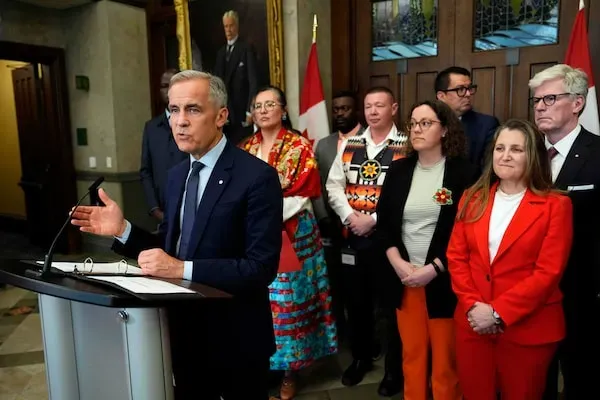The Indigenous consultation Bill C-5 is set to redefine how Canada approaches major infrastructure projects while navigating the complex relationship with First Nations. As the Liberal government’s projects bill progresses, it raises critical questions regarding the essential role of Indigenous consultation in national interest projects. The legislation, a response to initiatives like the Idle No More movement, emphasizes the importance of consulting First Nations when their lands and rights are affected. Critics warn that rushing such significant changes could provoke a resurgence of protests reminiscent of past Indigenous activism. Ultimately, Bill C-5 seeks to balance economic development with respect for Indigenous rights, but its implementation will determine whether it builds bridges or deepens divides across Canada.
Bill C-5, a pivotal piece of legislation introduced by the Liberal government, aims to streamline federal approval for major infrastructure projects with national significance. This initiative, which holds the potential to reshape First Nations consultation dynamics, highlights the urgent need for a collaborative approach in project development. Echoing the principles advocated by the Idle No More movement, the legislation seeks to address longstanding grievances over inadequate consultation with Indigenous communities. Proponents argue that enhancing efficiency in project approval can propel economic growth; however, significant concerns remain over the protection of Indigenous rights. As this legislation unfolds, its implications on both infrastructure development and the relationship between Canada and its Indigenous populations are being closely scrutinized.
Understanding Bill C-5 and Its Implications for Indigenous Rights
Bill C-5 represents a controversial shift in Canada’s approach to major infrastructure projects. By allowing the federal cabinet to fast-track projects deemed to be in the ‘national interest,’ this legislation raises significant concerns among Indigenous communities. Critics argue that without meaningful consultation and partnership with First Nations, the bill could undermine existing rights and lands. As history has shown, when Indigenous populations feel marginalized in decision-making processes, it can lead to serious backlash, igniting movements akin to Idle No More.
For many Indigenous leaders, the passing of Bill C-5 feels like a betrayal of the progress made in recent years toward reconciliation and partnership. Indigenous activists emphasize the necessity for proper consultation when developments affect their territories, as neglecting this can reignite tensions and protests. In particular, the fear that the new legislation could repeat historical patterns of exploitation around resource development has prompted a call for vigilance among Indigenous groups, highlighting that nothing is off limits in their struggle for rights and recognition.
The Risk of Renewed Activism: Idle No More Movement Resurgence
The specter of the Idle No More movement looms large in the wake of Bill C-5. Activists recall the widespread protests that erupted in 2012 as a response to perceived indignities against Indigenous sovereignty and rights. Now, with similar frustrations brewing over the current legislation, many anticipate a resurgence of activism. There is a growing sentiment among First Nations that if they are not treated as equal partners in discussions surrounding national interest projects, we could see mobilization efforts that draw on the spirit of past movements.
Cindy Woodhouse Nepinak, National Chief for the Assembly of First Nations, has already indicated that Indigenous groups are prepared to take significant action against the Liberal government’s projects bill. With a history of activism rooted in the need for justice and recognition, many First Nations communities are ready to engage in protests similar to those seen during the Idle No More era. This response could amplify calls for transparency and accountability from the government concerning how national interest projects are defined and executed.
The Intersection of Development and Indigenous Consultation
The Liberal government’s push for rapid infrastructure development poses challenging questions about how to balance economic growth with Indigenous rights. While the need for projects in sectors like mining and energy are critical for national competitiveness, the implementation of Bill C-5 reveals a potential oversight in adequately consulting First Nations. The legislation has been criticized for granting the federal government broad powers while sidelining crucial discussions with Indigenous communities who have a vested interest in these developments.
Supporters of the bill argue that fast-tracking projects is essential for economic recovery, especially in response to pressures like American tariffs. However, as Indigenous groups call for their voices to be heard, the debate reveals deep-seated tensions regarding the definition of ‘national interest’ itself. Sustainable development includes the input and involvement of those directly impacted, and without a framework ensuring meaningful consultation, the Liberal government risks alienating those communities while igniting further conflict.
Economic Growth vs. Indigenous Rights: A Delicate Balance
The dilemma at the heart of Bill C-5 lies in reconciling economic development with the rights of Indigenous peoples. Proponents argue that significant infrastructure projects are necessary to boost economic prosperity, especially within resource-rich areas. Nonetheless, this perspective often overlooks the essential need for Indigenous consultation, as many First Nations communities view these projects not just as economic opportunities, but as potential violations of their sovereignty and rights.
Further complicating the narrative is the concern that by enabling rapid project approvals, the government could inadvertently set back years of progress in Indigenous consultations and partnerships. As Indigenous leaders like Alvin Fiddler express deep distrust toward the current trajectory, they highlight the urgency of establishing a system where economic aspirations are aligned with the rights and welfare of Indigenous populations. Only through cooperative dialogue and sincere acknowledgment of Indigenous governance can Canada hope to achieve the balance needed for a truly inclusive developmental strategy.
Government Accountability in Indigenous Consultations
As Bill C-5 paves the way for expedited project approvals within Canada, the question of government accountability toward Indigenous communities comes to the forefront. The legislation’s potential to bypass traditional consultation processes raises alarms for many advocates, fearing it could lead to a repeat of historical injustices. For effective governance, it is crucial that the federal government commits to not only engaging with but also listening to First Nations perspectives before labeling projects as being in the ‘national interest’.
Moreover, ensuring strong mechanisms for Indigenous input is essential for restoring trust that may have been jeopardized by the rapid passage of this law. As Prime Minister Carney has acknowledged the need for further consultations, the onus remains on the government to create genuine pathways for Indigenous voices in project decision-making. This approach will not only mitigate unrest but also facilitate partnerships that are beneficial for all parties involved.
The Impact of Bill C-5 on Future National Projects
Bill C-5 represents a pivotal shift in how national interest projects are approached in Canada. By granting increased power to federal authorities, the legislation aims to streamline the approval process for essential infrastructure. However, this shift raises significant concerns among Indigenous communities who worry that their rights and interests may be compromised in the rush to develop. This could set a dangerous precedent, where expedited approvals lead to diminished consultations, ultimately affecting future generations.
The fallout from Bill C-5 highlights the critical need for an ongoing dialogue about what constitutes national interest. As Indigenous groups assert their rights and demand to be treated as partners, the future of national projects hinges on the government’s ability to foster genuine collaboration rather than unilateral decision-making. Achieving a balance between necessary development and respect for Indigenous rights will be key to navigating the complexities brought forth by this legislation.
Challenges in the Path of Infrastructure Development
With the introduction of Bill C-5, challenges have arisen in the path of implementing major infrastructure projects across Canada. While the intent is to enhance efficiency in project approvals, many Indigenous leaders caution against the potential risks of bypassing comprehensive consultations. Historically, many development initiatives have led to significant conflicts with First Nations communities, and without proper dialogue, the current legislation may foster similar outcomes, creating a rift in relations between the government and Indigenous peoples.
In addition, the complexity of defining what constitutes national interest only complicates this issue further. As various stakeholders, including business groups and Indigenous organizations, have differing definitions and expectations, the risk of misalignment could lead to project delays and escalated tensions. Moving forward, it is crucial to prioritize inclusive discussions that integrate all perspectives, ensuring that the development of infrastructure aligns not just with economic imperatives, but also with the rights and voices of First Nations.
Future Implications for Indigenous Relations in Canada
The implications of Bill C-5 extend beyond immediate project approvals; they have significant long-term effects on Indigenous relations in Canada. As the federal government rolls out the provisions of this legislation, the expectations from Indigenous communities call for transparency, respect, and genuine engagement. The passage of this bill has potential to either fracture trust once more or pave the way for a renewed commitment to reconciliation if handled correctly.
As Indigenous communities mobilize around their rights and assert their role in discussions about national interest projects, the government must recognize that sustainable development can only be achieved through a commitment to meaningful partnerships. The future of Indigenous relations in Canada may very well depend on how effectively the principles of consultation and respect are implemented in practice, ensuring that the rights of Indigenous peoples are not merely an afterthought in the face of economic ambition.
The Role of Advocacy in Shaping Project Approvals
Advocacy plays a crucial role in shaping how infrastructure projects are approved and executed under the frameworks like Bill C-5. Indigenous leaders and activists are increasingly vocal about their rights, demanding proper consultation and inclusion in decision-making processes concerning projects that impact their lands and communities. The Idle No More movement has shown how effective grassroots advocacy can be in influencing public discourse and government policy, indicating the potential for similar movements to emerge in response to current events.
Organizations representing Indigenous interests have begun to mobilize, urging both the government and the public to pay attention to the nuances of how national interest projects are defined and pursued. This advocacy is essential not just for immediate accountability, but also for establishing a legacy of respect and partnership between Indigenous populations and the Canadian government for years to come. A collaborative approach to infrastructure development, strongly influenced by Indigenous voices, can lead to more sustainable and equitable outcomes for all Canadians.
Frequently Asked Questions
What is Indigenous consultation Bill C-5 and how does it relate to the Idle No More movement?
Indigenous consultation Bill C-5 is a federal legislation that allows the Canadian government to expedite major infrastructure projects deemed in the ‘national interest,’ potentially bypassing normal consultation rules. This has raised concerns among Indigenous groups, sparking fears of renewed activism reminiscent of the Idle No More movement, which advocated for proper consultation and partnership with First Nations on projects affecting their lands.
How does Bill C-5 affect First Nations consultation processes in Canada?
Bill C-5 significantly impacts First Nations consultation processes by granting the federal government extensive powers to fast-track projects without comprehensive Indigenous input. Many Indigenous leaders argue that this undermines their rights and the principle of meaningful consultation, leading to potential conflicts and reactions reminiscent of the Idle No More movement.
What are the major criticisms surrounding the Liberal government’s projects Bill C-5?
Major criticisms of Bill C-5 include the perception that it grants excessive power to the government to prioritize certain projects over others while neglecting proper consultation with Indigenous communities. Critics argue that this approach could exacerbate distrust and conflict, echoing sentiments felt during the Idle No More movement.
How might Indigenous activists respond to the passing of the Liberal government’s Bill C-5?
Indigenous activists could respond to the passing of Bill C-5 with protests and other forms of resistance, as suggested by leaders such as Cindy Woodhouse Nepinak. Given the concerns about inadequate consultation, there’s potential for activism akin to the Idle No More movement, emphasizing the need for First Nations to be treated as equal partners in decision-making.
What is the significance of the term ‘national interest’ in the context of Bill C-5?
In the context of Bill C-5, ‘national interest’ is a significant and contentious term as it determines which projects can be prioritized for expedited approval by the federal government. This term’s interpretation has sparked debate among various stakeholders, including Indigenous groups who feel their rights may be compromised in the rush to develop infrastructure deemed in the national interest.
How does Bill C-5 align with recent trends in Canada’s infrastructure legislation?
Bill C-5 aligns with recent trends in Canada’s infrastructure legislation by reflecting a broader move toward fast-tracking major projects, as seen in similar bills passed in Ontario and British Columbia. However, opposition persists over claims of inadequate consultation with Indigenous communities, emphasizing the ongoing need for meaningful engagement in such legislative frameworks.
What assurances has the government provided to Indigenous communities regarding Bill C-5?
The government has assured Indigenous communities that it intends to engage in consultations before proceeding with projects deemed in the national interest under Bill C-5. Despite these assurances, many Indigenous leaders remain skeptical, fearing that the expedited nature of the bill may still lead to decisions made without proper dialogue and consent.
| Key Points | Details |
|---|---|
| Introduction of Bill C-5 | Bill C-5 aims to fast-track major infrastructure projects deemed to be in the national interest by the federal cabinet, which can bypass normal approval procedures. |
| Potential for Indigenous Protests | Indigenous activists warn of possible protests similar to the Idle No More movement if they feel excluded from consultation regarding project impacts on their rights and lands. |
| Concerns Over National Interest Definition | The definition of ‘national interest’ associated with project approval is contentious, with differing views between the government, businesses, and Indigenous groups. |
| Indigenous Groups’ Reactions | Some Indigenous leaders express readiness to fight against the legislation, fearing it undermines their rights and partnerships. |
| Criticism of Government Power | Critics suggest that the bill grants excessive power to the federal government, enabling bypassing of Indigenous rights protections. |
| Trust Erosion | Indigenous leaders assert that trust between federal and Indigenous governments has deteriorated with this legislation. |
| Future Consultations | The government has promised to conduct consultations with Indigenous groups following the bill’s passage, acknowledging the need for further dialogue. |
Summary
The Indigenous consultation Bill C-5 is at the center of a heated debate surrounding its implications for major infrastructure projects in Canada. As First Nations express concerns over inadequate consultation and potential infringement on their rights, the government faces imminent pressure to honor partnerships and expectations. With possible protests looming, both sides must navigate these complex relations to avoid repeating mistakes of the past.



